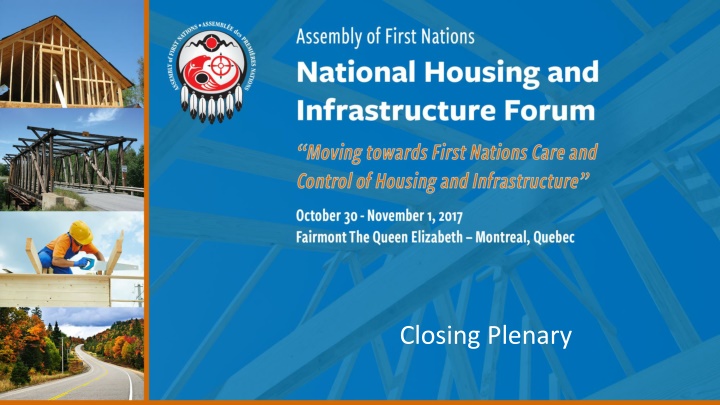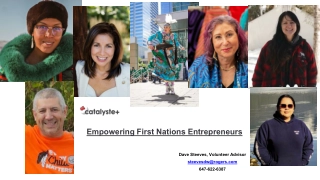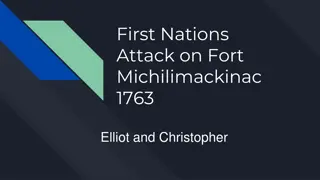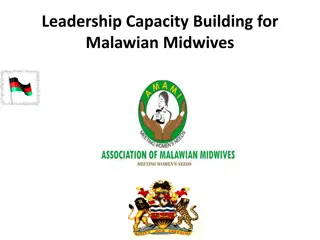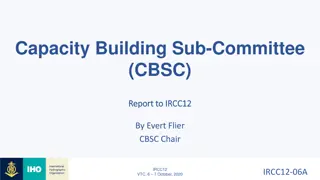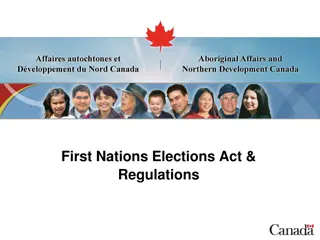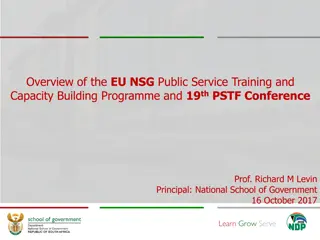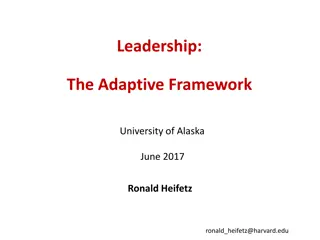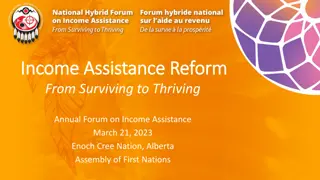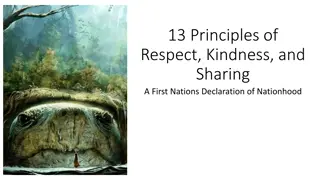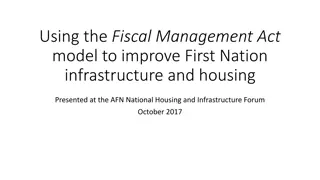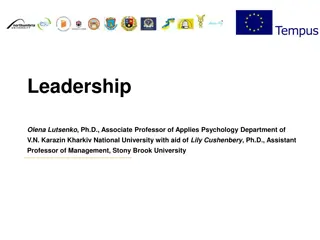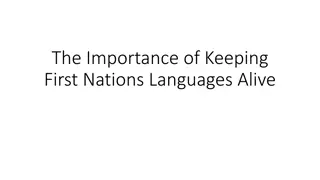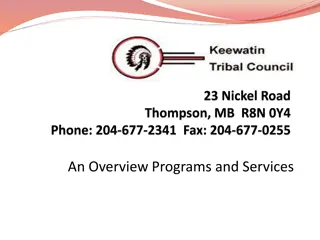First Nations Leadership Insights and Capacity Building
In this event summary, discover the key highlights of the First Nations Health Authority's institutional model, the Atlantic Policy Congress of Chiefs Clean Water Initiative, regional engagement updates, skills development programs, and initiatives for housing and infrastructure improvement. Learn about key projects, partnerships, and strategies aimed at empowering First Nations communities and ensuring sustainable development.
Uploaded on Mar 12, 2025 | 2 Views
Download Presentation

Please find below an Image/Link to download the presentation.
The content on the website is provided AS IS for your information and personal use only. It may not be sold, licensed, or shared on other websites without obtaining consent from the author.If you encounter any issues during the download, it is possible that the publisher has removed the file from their server.
You are allowed to download the files provided on this website for personal or commercial use, subject to the condition that they are used lawfully. All files are the property of their respective owners.
The content on the website is provided AS IS for your information and personal use only. It may not be sold, licensed, or shared on other websites without obtaining consent from the author.
E N D
Presentation Transcript
Opening Summary Day 1 Opening remarks by the Leadership First Nation Health Authority The emergence of a First Nations driven institution The development process of the organization and the key lessons learned Nothing for us without us The benefits of this First Nations institutional model Atlantic Policy Congress of Chiefs Clean Water Initiative The creation of a water authority structure Full service decentralized model of 6 hubs of service regions. Current project initiatives Financial analysis, Life cycle analysis, Corporate structuring 2
Opening Summary Regional Updates on Engagement Sessions Saskatchewan Quebec and Labrador British Columbia Atlantic National Update First Nations control of Housing and Infrastructure is the consistent messaging from the Regions Engagement and dialogue sessions must continue so First Nations lead the development of a First Nations National Housing and Infrastructure Strategy Memorandum to Cabinet: national housing strategy. Co-development is opportunity to share our story, we want to ensure our story is reflected 3
Skills and Capacities First Nations Human Resources Development Commission of Quebec Nine students who graduated with a certificate in Quebec Housing Management Program were honoured and acknowledged Skills and Capacities Introductory Panel Highlights Canadian First Nations Safety Association Corp Tobique First Nations partnership with Habitat for Humanity First Nations Technical Services Advisory Group First Nations Sustainable Communities IGNITE infrastructure association 4
Skills and Capacities Aboriginal Housing Protective Association Mold remediation and protection for First Nations housing Membership driven organization providing training and certifications Indigenous Children s Respiratory Health and Indoor Air Quality NAN leadership is committed to improved air quality The dangers and hazards of wood stove heating Project Management and Planning in First Nations Projects Project planning and management principles Some First Nations are utilizing construction management techniques for current projects A layered Approach to Capacity Building in Housing TSAG developed and designed 3 programs targeting at improving housing in First Nations Preventative Maintenance Program, the Housing Condition Assessment program and Housing Managers Certificate Program. First Nations O&M Cost Comparison/Climate Change Vulnerability Assessment Demonstrated the funding disparity between First Nations and compare it to the formula funding from INAC. Overall results show that First Nations expenditures exceed net funding requirements for most asset types 5
Funding and Finance Day 2 Funding and Finance Introductory Panel highlights First Nations Financial Management Board First Nations Tax Commission First Nations Finance Authority 6
Funding and Finance Long term financing, housing infrastructure schools and economic development Examined how to work with banks and financial institutions to obtain long term financing options First Nations need to be able to access new options that can allow for strategic investments First Nations Finance Authority Focused on the mechanics of the FNFA and the various revenue sources that could be used to support application of the initiative Provided an overview of the various First Nations projects currently under investment by FNFA Financing First Nations Housing and Infrastructure (ABSCAN) Demonstrated the evolution of ABSCAN & the local response to housing challenges through new financing tools Indigenous solutions and private home ownership, system will be a model for future financing for First Nation housing Disciplined Project Finance Approach for Building Infrastructure & Housing Taking lessons learned from financing power projects in First Nations and applying those to housing and infrastructure financing in First Nations Debt service coverage assurances and their use in project financing in First Nations housing and infrastructure 7
Governance and Delivery Day 2 Governance and Delivery Introductory Panel highlights APC The importance of Community Buy in for Governance Clear Directions Been their, done that, time for something new Public Safety Canada Strengthening Indigenous Emergency Management 8
Governance and Delivery Digital Tools for Housing Management Provided a demonstration of the system (LOUIS) and overview of the functionality Management systems that can improve housing and infrastructure outcomes Accessibility Legislation What are gaps to housing, infrastructure and emergency preparedness exist for disabled indigenous people? Need to address accessibility issues through a distinct First Nations approach Comprehensive Community Planning Processes The steps to develop a community based, culturally appropriate comprehensive community plan ?AQ AM s own culturally congruent model for self-development is in its 8th year of implementation, guided by 12 sets of activities plans including Housing and Infrastructure Reclaiming our Traditions and Creating a Path to Self Governance 7 Generations Framework is a true First Nation approach to address water and wastewater systems, truly community driven. Construction Worker 101 Youth participants receive First Aid tickets; WMIS; construction and safety tools and mentoring On their own time over 6 weekends, the youth built this 375 square foot home. For some, gaining a confidence in themselves and a pride. They built a house from scratch and built it from the ground up. 9
Innovation Innovation Panel Highlights Innovations in Urban Design Building innovation into passive house design Tiny homes from Sea Containers Innovation Keynote Speaker Ken Thomas Modular construction 10
Recommendations There is a need and requirement for First Nations to lead the engagement and dialogue on their views and perspectives on the transfer of care and control of housing and infrastructure Regions are developing of their own housing and infrastructure strategies and continued financial and policy support is required to maintain momentum Identification of early success opportunities and building on First Nations developed housing and infrastructure solutions to underpin the First Nations housing and infrastructure strategy More attention on creating the Housing and Infrastructure practitioners network 11
Next Steps Working with the AFN, the data collected from worksheets, notes from plenary and workshop will be analyzed, correlated and synthesized into a final report on the Forum The Forum will be shared with all participants and will be made available on the AFN website Findings from this Forum will also inform the development of the First Nations National Housing and Infrastructure Continued engagement and dialogue will be required in order to ensure that all regions have the opportunity to develop their own strategies Reporting on the Forum results to the Special Chiefs Assembly in December 2017 12
